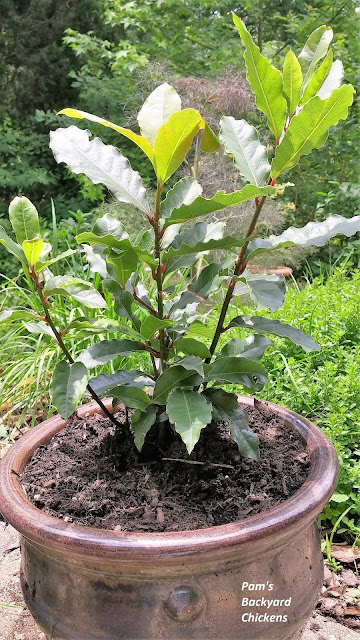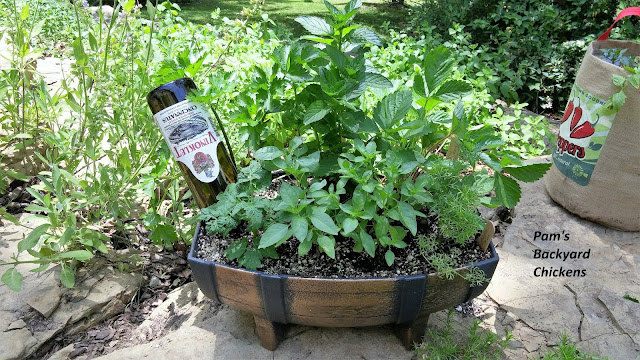Many folks successfully grow herbs in a kitchen garden with vegetables and tuck them in the landscaping. Growing herbs in pots expands that versatility and allows you to locate them anywhere you’d like. Since we can use herbs in so many daily tasks, it’s nice to keep them handy; maybe near your kitchen so you can always snip a few favorites as you’re cooking.
Planting Herbs in Pots to Beat the Winter Cold
Although most herbs are hardy and overwinter right in the garden, there are some herbs that can’t take cold northern winters. I like to overwinter my rosemary plants and bay laurel tree plus I’ve been trying my hand at pineapple sage and lemon verbena. For that matter, there are some herbs you want to have handy all year round. I love growing chives and growing basil indoors during the winter. So, planting herbs in pots allows you the flexibility to move them outdoors in warm weather and indoors in cold weather.
Keeping Invasive Herbs in Check
Some herbs, especially those in the mint family, are ultra-hardy and can become invasive. But no herb garden would be complete without them. Think of the many peppermint plant uses and the wonderful drinks you can make with Kentucky Colonel Spearmint. Mint is a must-have plant but nobody wants it overtaking a patch of lemon thyme or choking out your lavender plants. So planting invasive herbs in pots and then sinking those pots in the ground can help keep them in check and allow you variety in your herb garden.
5 Tips for Success with Potted Herbs
1. Pick out plants with similar requirements. Herbs aren't picky plants, but like everything, they do have some requirements to make them happy and healthy. So, it's good to look at the sun, soil and water needs for the plants you'd like to grow. Then group them accordingly so their companions have similar requirements and place your pots where those needs will be met. For instance, don't put shade-loving herbs out in full sun and vice versa.
2. Get the right pot. You can group your herbs to make a themed pot or grow them in single pots and put those together to make a wonderful display. But, either way, make sure your pot is big enough to hold your plants, not just on the day you're planting herbs in pots, but also when they mature to their full height. For instance, I love growing pineapple sage, but I never plant it in a container with other herbs. I plant it in a big deep container because it grows over two feet tall and a foot wide with large spiky red flowers. Anything other than maybe some trailing plants that hang over the side of the pot is crowded out. And, while rosemary can be great in mixed containers, I always remember it likes deep feet so I stay away from shallow containers.
3. Allow for proper drainage. As a rule, herbs don't like wet feet. Many of them are native to the Mediterranean and don't appreciate standing water. So make sure to use the proper soil for your plant and make amendments to that soil if needed. For instance, I add sand to my rosemary containers to enhance drainage. Also, be careful of the pot you pick. Some pots are self-watering. This is perfect for herbs like chives, parsley and mint but not so great for oregano and thyme that like to dry out between waterings.
4. Don’t forget about the elements. Herbs that are planted directly in the garden don’t have weather like wind and sun beating down on their roots constantly, but planting herbs in pots does expose them more to the elements. Plants in a terra cotta container can dry out quickly as well as single plants in smaller containers. So, when the plant guides say certain herbs like 6 or more hours of sun, can your pot handle that? There are some things you can do to combat this. Don’t set the pot on a dry, harsh surface like concrete in the hot sun. Try putting the pot directly on the soil in a sunny part of the garden where you may need to fill a gap in the plantings. Or, give that planter a little more shade. Many herbs that are sun-loving can adjust to partial shade. Either way, remember that planting herbs in pots will require a little extra care from you.
5. Have Fun! With so many rules placed on us, remember there are very few rules when it comes to planting herbs in pots. So, be creative. Plant your containers lightly and let the herbs grow to fill in. Or plant them heavily and prune often. Try different combinations. I love to give my herb pots themes. Try a lemon theme, putting together lemon mint, lemon verbena, lemon-scented geraniums, lemon basil and some miniature lemon tomatoes. There’s no right or wrong and the good thing is containers are mobile, so if something isn’t thriving in one place, move it to another.
Although most herbs are hardy and overwinter right in the garden, there are some herbs that can’t take cold northern winters. I like to overwinter my rosemary plants and bay laurel tree plus I’ve been trying my hand at pineapple sage and lemon verbena. For that matter, there are some herbs you want to have handy all year round. I love growing chives and growing basil indoors during the winter. So, planting herbs in pots allows you the flexibility to move them outdoors in warm weather and indoors in cold weather.
Some herbs, especially those in the mint family, are ultra-hardy and can become invasive. But no herb garden would be complete without them. Think of the many peppermint plant uses and the wonderful drinks you can make with Kentucky Colonel Spearmint. Mint is a must-have plant but nobody wants it overtaking a patch of lemon thyme or choking out your lavender plants. So planting invasive herbs in pots and then sinking those pots in the ground can help keep them in check and allow you variety in your herb garden.
5 Tips for Success with Potted Herbs
1. Pick out plants with similar requirements. Herbs aren't picky plants, but like everything, they do have some requirements to make them happy and healthy. So, it's good to look at the sun, soil and water needs for the plants you'd like to grow. Then group them accordingly so their companions have similar requirements and place your pots where those needs will be met. For instance, don't put shade-loving herbs out in full sun and vice versa.
2. Get the right pot. You can group your herbs to make a themed pot or grow them in single pots and put those together to make a wonderful display. But, either way, make sure your pot is big enough to hold your plants, not just on the day you're planting herbs in pots, but also when they mature to their full height. For instance, I love growing pineapple sage, but I never plant it in a container with other herbs. I plant it in a big deep container because it grows over two feet tall and a foot wide with large spiky red flowers. Anything other than maybe some trailing plants that hang over the side of the pot is crowded out. And, while rosemary can be great in mixed containers, I always remember it likes deep feet so I stay away from shallow containers.
 |
| Cinnamon basil, spicy globe basil, rosemary, and marigolds. |
4. Don’t forget about the elements. Herbs that are planted directly in the garden don’t have weather like wind and sun beating down on their roots constantly, but planting herbs in pots does expose them more to the elements. Plants in a terra cotta container can dry out quickly as well as single plants in smaller containers. So, when the plant guides say certain herbs like 6 or more hours of sun, can your pot handle that? There are some things you can do to combat this. Don’t set the pot on a dry, harsh surface like concrete in the hot sun. Try putting the pot directly on the soil in a sunny part of the garden where you may need to fill a gap in the plantings. Or, give that planter a little more shade. Many herbs that are sun-loving can adjust to partial shade. Either way, remember that planting herbs in pots will require a little extra care from you.
5. Have Fun! With so many rules placed on us, remember there are very few rules when it comes to planting herbs in pots. So, be creative. Plant your containers lightly and let the herbs grow to fill in. Or plant them heavily and prune often. Try different combinations. I love to give my herb pots themes. Try a lemon theme, putting together lemon mint, lemon verbena, lemon-scented geraniums, lemon basil and some miniature lemon tomatoes. There’s no right or wrong and the good thing is containers are mobile, so if something isn’t thriving in one place, move it to another.
 |
| Bay Laurel Tree in a pot. |





No comments:
Post a Comment